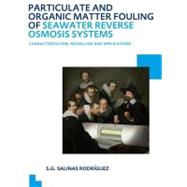Particulate and Organic Matter Fouling of Seawater Reverse Osmosis Systems: Characterization, Modelling and Applications. UNESCO-IHE PhD Thesis
, by Salinas Rodriguez; Sergio G.- ISBN: 9780415620925 | 0415620929
- Cover: Nonspecific Binding
- Copyright: 9/27/2011
Characterizing bulk organic matter in seawater and bay water by various analytical techniques and linking these measurements with fouling in membrane systems. Furthermore, it aimed for the development of the Modified Fouling Index - ultrafiltration (MFI-UF) at constant flux filtration as an accurate test to measure the particulate fouling potential of a feed water and predict the rate of fouling in reverse osmosis systems. A new semi-portable set-up has been successfully developed to perform MFI-UF tests at constant flux filtration. A significant effect of the filtration flux on the fouling potential was found. Consequences of this effect for reverse osmosis systems are that the fouling potential at low flux drops dramatically; for ultrafiltration systems it implicates that the rate of fouling increases at high fluxes. The observed effect of flux on the fouling potential has significant implications for fouling potential measurements. Deposition factors in RO systems varied between 0 and 1, depending on location and MFI pore size, which indicates differences in properties of the particles present. Fouling potential results in RO fouling rates of 0.2-1 bar/month depending on the pore size of the membranes used for MFI measurements. The fouling potential of the analysed raw waters is substantially reduced by conventional pre-treatment systems and ultrafiltration: for conventional pre-treatment 37 % - 74 % and ultrafiltration 60 % - 95 %, depending on the location and the MFI pore size.






